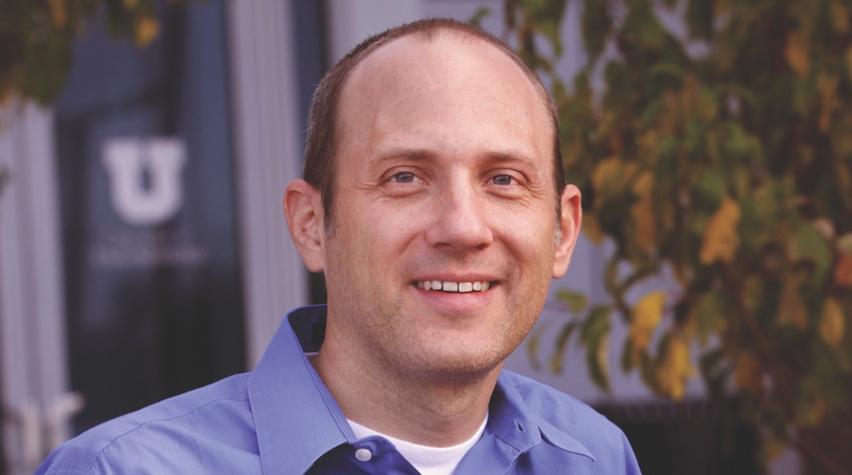
As part of its continuing efforts in diversity and inclusion, AIChE is introducing a series focused on LGBTQ chemical engineers. Other related efforts include Safe Zone Workshops held at the 2015 Spring Meeting and the 2016 Annual Meeting, which was also accompanied by a leadership reception for LGBTQ members and allies.
Launching this series, AIChE senior member and Professor of Chemical Engineering and Materials Science Alon McCormick interviews 15-year member Anthony (Tony) Butterfield of the University of Utah. The National Organization of Gay & Lesbian Scientists and Technical Professionals (NOGLSTP) recently recognized Tony as recipient of its 2017 Educator of the Year Award for his outstanding achievements in LGBTQ inclusion and for his contributions to the field of engineering education, both at the University of Utah and nationally.
Tell us a bit about your job and your job responsibilities. What’s a typical day at work?
As lecturing faculty, my number-one responsibility is to assure our students develop the skills needed to become talented chemical engineering professionals. I teach our freshman introductory chemical engineering course and our freshman design laboratory. I then get to see these same students as seniors in our two capstone unit ops laboratories. I also advise our AIChE student chapter, Chem-E-Car team, department K-12 outreach team, and our university’s oSTEM student group (a student organization for LGBTQ students in STEM disciplines). Most of my day is happily spent educating and interacting with our next generation of chemical engineers.
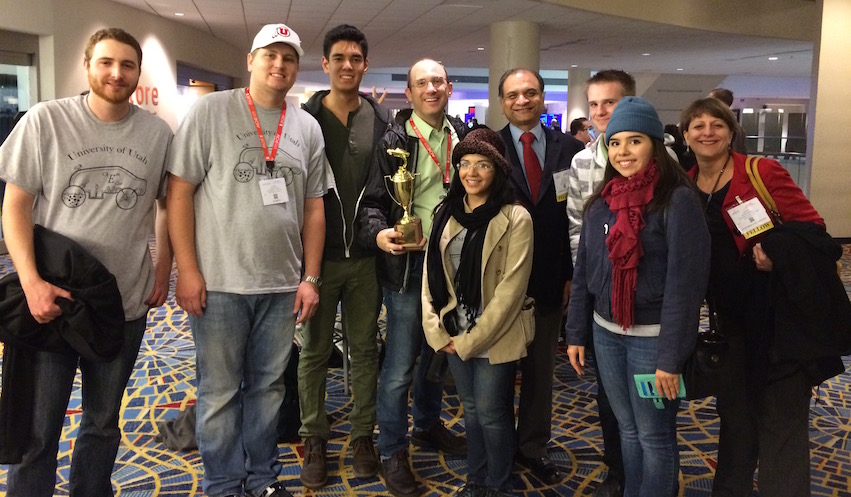
My research interests center around engineering pedagogy. Specifically, I study the intersection between virtual teaching tools and hands-on makerspace projects, the means to increase STEM inclusion of underrepresented students, and K-12 outreach methods. I also conduct research on low-cost air quality monitoring and best practices for engaging citizen-scientists to conduct meaningful research into problems that affect community health.
Tell us a bit about your experience as an out LGBTQ professional working in chemical engineering.
In my first job, on my first week, my boss "warned" me that new employees had to attend diversity training and that the training would be facilitated by a gay man, though he used pejorative slang for gay men. I had been out of the closet since 15, and out without problem in my previous job at a lumber yard, but I got the message that to keep my job as an engineer I had to lie about my family. Embarrassingly, I did not stand up for myself; I kept family photos off my desk and switched pronouns when asked about my "wife." After several more anti-LGBTQ statements from my boss I had to leave that job.
If you are in the room when something discriminatory is said or done, point it out and help address it.
Given a couple other similar on-the-job experiences, I worried I might not find a welcoming workplace as a chemical engineer. I decided to take my chances in academia and get my PhD. There I found an excellent advisor; it was a great relief to find a home where I was valued for my capabilities. I could attend, say, our research team barbecues with my spouse without risking my career.
A lot has thankfully changed in the chemical engineering community since the 90s. I now work with a very supportive team of colleagues. Over the last two decades, our department has gone from one in which gay jokes were told by faculty in lecture when I was a student, to a department that actively welcomes and advocates for their LGBTQ students and faculty. Being a gay man can still lead to complications for me as a chemical engineering professional, particularly outside my department, but I find, more times than not, people are not outright hostile and enough mutual respect can be achieved to get the job done.
What are the most important issues that LGBTQ engineers deal with in the workplace today?
In my workplace the most significant hurdles I see are faced by our future chemical engineers. LGBTQ students still experience jabs from peers, and faculty who insist on, for example, misgendering them. There are few out role models within STEM fields on campus, in the media, and in the larger public sphere. Furthermore, LGBTQ engineering students may lose familial support in the midst of their education. I fear the most significant issues LGBTQ chemical engineers face occur when they are still young potential engineers.
These problems can certainly be greatly exacerbated in engineering fields, which have a history of excluding certain populations. Students who are LGBTQ and belong to other underrepresented groups face multiplied barriers to entry. To bring their talents into our field, we must work harder as chemical engineers to help our LGBTQ students finally find engineering workplaces that will welcome them.
As engineering students enter the workforce, the biggest concern likely becomes deciphering the climate of a new workplace. An applicant’s LGBTQ status is not apparent and the acceptance of LGBTQ employees is not often a topic a prospective employee would feel comfortable asking. While many workplaces would be supportive these days, the professional risks are very high for LGBTQ employees in a hostile work climate.
Once LGBTQ professionals settle into their engineering career, even if it’s in an absolutely welcoming environment, I believe most of us must work hard to avoid entertaining Imposter Syndrome feelings, as often occurs in minority professionals. I know, even after finding a professional home, I still reflexively feel as though I must work twice as hard to be valued equally as an LGBTQ engineer. Such feelings can lead to undue stress and even become counterproductive when you don’t take time to disengage from the workplace, spend time with family, and recharge.
Do you know others in the profession who struggle with being out in today's workplace?
Yes, certainly. I know some faculty who are not nearly as fortunate in their campus climate as I have been. It’s draining for them to have to either stay in the closet and strictly guard their personal lives or come out and face discrimination from coworkers or even students.
How can people (peers who are allies, and members of management and leadership who are allies) help foster a more inclusive environment for LGBTQ chemical engineers?
First, I think it is important to be "out" yourself if you are an ally. Make your positions on supporting and welcoming LGBTQ engineers clear, particularly if you are in management. If you wait for someone to come out before you express support, they may never come out, and unhealthy climates can fester. If you are in the room when something discriminatory is said or done, point it out and help address it. There were many times I could have used an ally in the workplace as a young gay engineer, but I never knew if I had one in any of my coworkers.
I also believe it is incredibly important on an organizational scale to send repeated signals to new, existing, and potential employees that discrimination of any sort will not be accepted, and to point employees towards resources available in the form of underrepresented employee groups and mechanisms to address discrimination, should it occur.
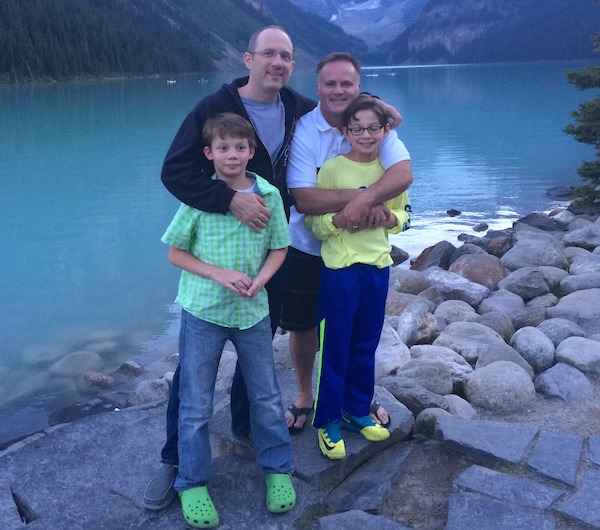
Does your organization do anything to foster inclusivity for LGBTQ people?
Yes. Our university has a very clear and public non-discrimination policy which is inclusive of gender and sexual orientation, and we are asked to include it on our syllabi. I am also the faculty advisor of our university’s oSTEM group, which supports and advocates for our LGBTQ STEM students. Our department has been very supportive of our LGBTQ students, helping us create a dialogue between students and faculty, host safe-zone trainings for faculty and staff, and sponsor social events.
How could AIChE help you to fulfill your professional and personal goals?
AIChE is a large and important part of my professional life, from advising our Chem-E-Car team at small regional conferences, to providing a venue at annual meetings to present my research to and learn from my colleagues from around the world. Last fall at the AIChE Annual Meeting, we had a well-attended social for LGBTQ chemical engineering professionals, and AIChE-sponsored safe zone training. The continued support of AIChE on traditional engineering fronts is of great value to my professional goals, and its past and future work to encourage the chemical engineering community as a whole to become more inclusive has and will make our profession even stronger.
Do you have any suggestions of what out LGBTQ chemical engineers can do to help make their professional climate safer, more welcoming, and more inclusive for diverse engineers?
I think the first thing to do is to know the legal rights in your particular jurisdiction, and know what your company has as their stated non-discrimination policy, because both the law and company policy can shape the tone of your workplace. If the company policy is not adequate, work to improve it. Next, I’d suggest seeking out opportunities to be an ally for someone else and finding allies in your organization.
When it comes to LGBTQ events in history, the most important event for my family was certainly the day our marriage became legally recognized in the US.
Often an ally can speak up, taking less risk than a minority employee. Lastly, I’d suggest reaching out to minority communities when it comes to recruitment and community engagement. Not only can such efforts lead to a more diverse employee community, but it also sends the message to existing employees that inclusion matters.
Tell us a bit about your personal life.
I’m a father of twin boys, now teenagers. My partner and I have been together since I was a freshman in college, 25 years. Because of the legal turmoil around our marriage, we actually had to get married four times before I could get my husband all the legal rights he deserved as a stay-at-home parent. As it is with most faculty, particularly those who are also parents, free time is a rarity, but when I do have it I typically spend it programming (it’s an oddly soothing activity for me).
Are there any LGBTQ inspirations, role models, or moments in history that are important to you?
I’ve always loved coding, and as an undergraduate I became enthralled with Alan Turing and his role as a founder of modern computing and in defeating the Nazis. As a young nerd, Turing struck me as a sort of nerd superhero. It wasn’t until I was a graduate student that I learned that Turing was also a gay man. That was the first time I’d ever heard of another gay scientist or engineer (the internet was not what it is now...). Having struggled in my first engineering jobs due to being a gay man, it was very heartening for me to learn that one of my existing STEM heroes was also a gay man, even if he did meet a tragic end.
When it comes to LGBTQ events in history, the most important event for my family was certainly the day our marriage became legally recognized in the US. My husband worked very hard for our family as I made it through school and in my career. He does not have nearly the same earning power as I do. The day we finally received equal legal rights and obligations, his sacrifices were finally given legal weight and I could finally relax, knowing I could get him health insurance regardless of where I worked and he would not be regarded as a legal stranger if it ever came to settling my estate.
Do you have a coming out story you’d like to share?
Relatively, I got through coming out easily. I’ve known too many LGBTQ kids who took years to recover and far too many who did not make it through at all. At the time I realized I was gay, in the heart of suburban Utah, I was pretty sure I was the only one in my state. After a couple desperate months, I broke down and told my parents. I was sure being gay meant a lonely life without the possibility of becoming a parent, and I was afraid my family might even ask me to leave our home. But I was luckier than most of the gay kids I’d eventually meet; my parents stayed firmly in my corner.
From that point, there are multiple coming out stories—each time a new student enters my office and their eyes wander to the photo of my family on my desk, I see it register. Sometimes it goes well; sometimes it doesn’t. But I have many great coworkers, I work with a lot of great students, and I go home each evening to a wonderful family. With that kind of support, I sometimes even forget that coming out can be an issue in my everyday life.
Do you have a story about an effective or inspirational professional ally you’d like to share?
Most recently I have been greatly inspired by Professor Stephanie Farrell of Rowan University. She is a fellow chemical engineer, and an incredibly effective and tireless ally of the LGBTQ STEM community, both at her university and worldwide. Over a year ago I became involved with one of her projects to strengthen LGBTQ inclusivity in engineering academia, which was the first NSF-sponsored project to study means to boost LGBTQ student and faculty involvement in STEM careers. Through her program she has brought safe zone trainings to many institutions and STEM events, including AIChE and ASEE annual meetings. She has inspired me and many others to do so much more for our LGBTQ students.
What’s your dream getaway?
A weekend with my family hiking in southern Utah’s national parks. Fortunately, with in-laws living in that area, I get to do my dream getaway about every other month.
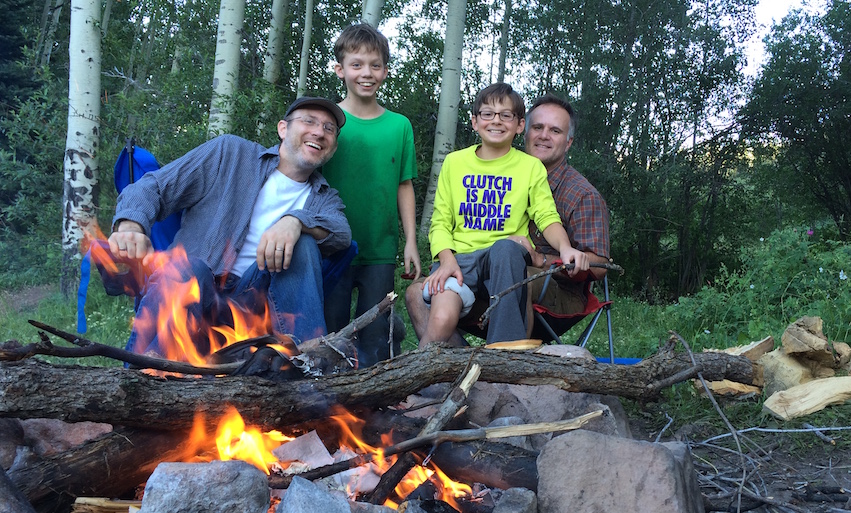
Who is your favorite LGBTQ icon?
If Alan Turing counts as a “LGBTQ icon,” then Alan Turing.
Gaydar: Does it exist?
As an academic, I have to say that the literature indicates that gaydar does, to some extent, exist:
Tabak, Joshua A., and Vivian Zayas. "The roles of featural and configural face processing in snap judgments of sexual orientation." PloS one 7.5 (2012): e36671.
I just wouldn’t assume you have it.
AIChE's Diversity and Inclusion Initiatives are supported by the AIChE's Foundation's Doing a World of Good Campaign.
To learn more about it, click here.
Interested in helping?
Are you an LGBTQ chemical engineer and AIChE member interested in sharing your story to help create awareness around diversity and inclusion? Are you an LGBTQ ally interested in helping with diversity and inclusion efforts? Send us a note at chenected@aiche.org with the subject "Diversity and Inclusion."



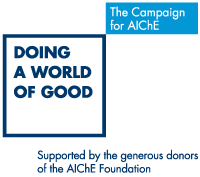
Comments
The AIChE has, like so many other business entities, fallen for worldly re-definitions of diversity and inclusion. Back in the "old days", diversity addressed traits such as the color of someone's skin or ethnic background, which are God-given and cannot be altered. Now, it has been expanded to include behaviors. This is a serious mistake. LGBTQ behaviors distort the natural order of gender and sex which has been given to us by our Creator God. Why should this be celebrated? Mark 10:6-7 (KJV) "But from the beginning of the creation God made them male and female. For this cause shall a man leave his father and mother, and cleave to his wife;"
Hey Rankine cycle, looks like you've got yourself a little mixed up. You're supposed to convert heat to mechanical energy, but it looks like you've got things the wrong way around! I presume this means you're stuck here with a broken turbine. Should I leave you to aimlessly putter in place, or assist in setting your engines right with a swift kick in the rear? Only too happy to oblige! Love, Born-this-way NB/femmeflux queer engineer :) P.S.: Dear Moderator: please carefully consider the above comments. Do they add anything to a reader's appreciation of this article? Or are they in direct violation of your user agreement? To prevent this kind of toxic hate speech in the future, I would strongly suggest utilizing a user-clickable "inappropriate" flag per comment, and/or more stringent policing of the forums. We all know what sort of noxious fumes always creep in semi-anonymously on the Internet, but it'd be nice to go to a forum without having to bring a gas mask. Thanks!
Dear Mr. Rankin, We respect your right to your opinion, however, please recognize that AIChE's members are brought together by science (not by common religious beliefs). We welcome members who respect one another as engineering professionals, just as they respect the science that unites them. Note that our code of ethics clearly states the following: "AIChE is committed to creating an environment in the Institute and profession in which all members, regardless of characteristics such as gender, race, religion, age, physical condition, sexual orientation, nationality or ethnicity, are valued and respected." Thank you.
By responding here to the first commenter, Gregory Rankin, I do not intend to argue with any person's religion. As a professional group we are brought together by our science, as Douglas states. In my experience, our shared professional tools are not going to settle debates of faith. I'd typically not respond at all--I don't imagine many minds get changed on comment threads--but I do know young potential LGBTQ chemical engineers are reading this article and this comment thread. I'm compelled here. Really, these young engineers should be ready, at times, to face this type of resistance to their inclusion. They may be told on the job that they don't count as diversity and they are not included in inclusion. Yes, be ready for that. I would actually encourage these young engineers to, as Mr. Rankin suggests, ask to be judged by their "behaviors" when this happens. Ask to be honestly judged by your actions, accomplishments, and talents, just like your colleagues, and not by your inborn or surface traits or the baggage that others reflexively place on them. If, for example, you told my same life story without evidence of inborn traits (like biological sex) to most any professional chemical engineer, you would likely get a positive reaction, maybe even from Mr. Rankin. The same 'lifestyle' would be respected if it only involved different apparent inborn anatomies. I don't think it's exactly a problem they have with you, as a person, or even your actions; it's culture and history weighing on us all. As such and as hard as it can be, I try to not take it personally, and I hope our young engineers can regard such hostility in the context of the histories we all bring to our professional lives. Bigotry must be called out and addressed, but I find it hurts me a bit less when I *try* to see where they're coming from. I want again to thank AIChE for stepping out front on this issue. Our profession's health depends on attracting talented new engineers without biases against any marginalized group. We need a diversity of views at the table to find truly innovative engineering solutions. If our students aren't welcomed into chemical engineering, they will take their talents to some other profession. I know these kids; losing them would be our great loss. While there will be challenges, I really just want our LGBTQ+ future engineers to know they can find a great professional home as a chemical engineer and in AIChE. There are many workplaces where you will be valued for your talents, included as an equal colleague, welcomed to talk about your weekend, and treated humanely for just being a person, as well as for being a talented chemical engineer.